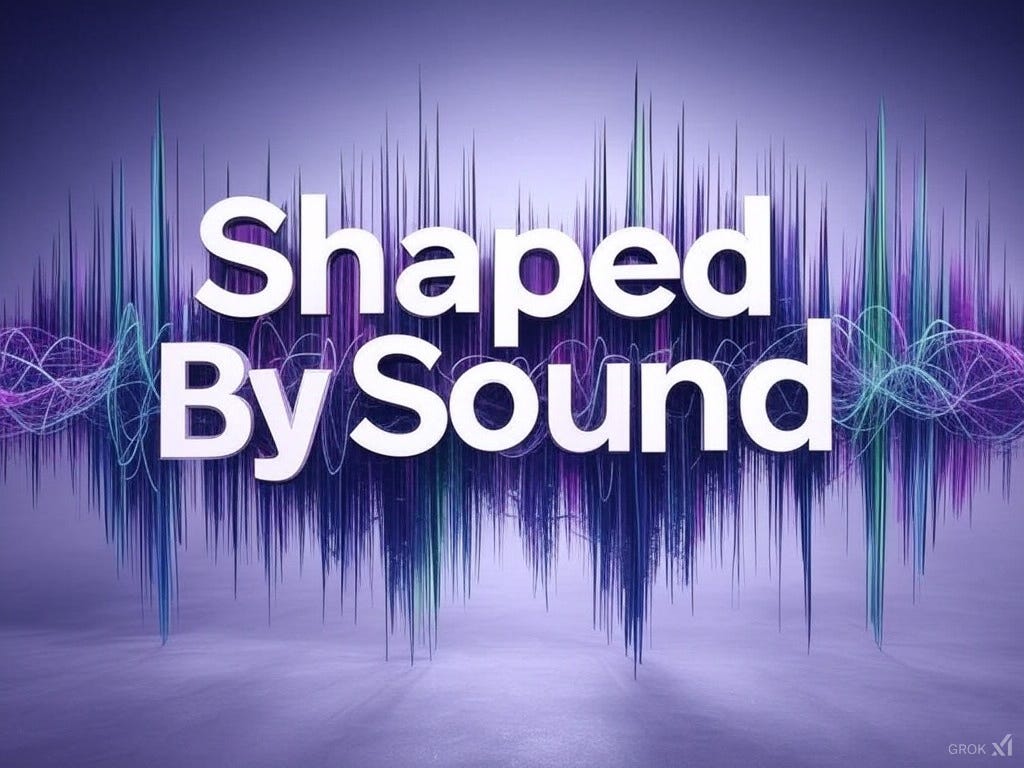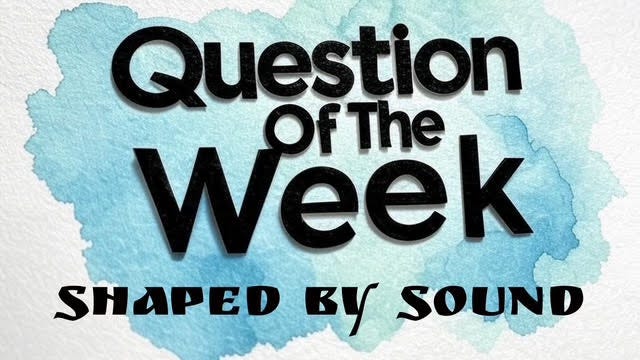Separate songs that wouldn’t be separated or Soulmate Songs also (part 2) SbS 07.30.25 Newsletter 37
Music Question: song soulmates continued and different Next: My weekly new music radio show. Week 1004. Our Notable Songs of July 2025 Musical thoughts: Dave Edmunds in hospital
Sonic Soul Mates: The Art of Musical Matrimony (And Other Harmonious Unions)
Last week, we geeked out over songs that belong together—those magical one-two punches where the intro track is basically the musical equivalent of a dramatic deep breath before the main event (looking at you, "Sirius" into "Eye in the Sky").
Listening to these songs individually may cause feelings of musical incompleteness
Today? Those that know me know - My mind operates in melodies rather than words. Yes, I think in music. I keep circling back to those paired songs on albums—not intros (that was last week). You know the ones that flow together so seamlessly you can't hear one without expecting the other.
Some songs weren’t meant to be paired… and yet, somehow, they’re always played together. Like peanut butter and jelly (or peanut butter and chocolate… or peanut butter and… okay, fine, maybe I just really love peanut butter). Music has its own iconic duos that DJs, playlists, and our brains refuse to separate.
The Robert Palmer Trilogy kept orbiting in my mind. The thought wouldn't leave me alone until it crystallized into certainty. Damn—I knew exactly what my next newsletter had to be about.
When Tracks Are Inseparable (And How They Torture Shuffle Mode)
We’ve all been victims of shuffle betrayal. You’re cruising through your playlist when suddenly—bam—you’re hit with the musical equivalent of a cliffhanger cut to commercials. That’s the curse of what we’ve been calling Soulmate songs. These are the track pairs that technically exist as separate songs but spiritually function as one unbreakable unit.
What Makes a Soulmate Song? If played alone, the first track feels amputated - like hearing "We Will Rock You" without "We Are the Champions," or "Eruption" without "You Really Got Me." Radio stations always play them together (or risk listener mutiny).
Why they’re shuffle’s worst nightmare. Random Play = Emotional Whiplash: Nothing kills a vibe faster. You know what it's like? You are sitting in a dimly lit theater. Popcorn in hand. On the screen builds tension with a series of escalating scenes. Just as the lead actor takes a deep breath to deliver the pivotal punchline that will tie everything together…the screen abruptly cuts to black. WTF?
The Fix (For the Obsessed) Manual Playlists: Let’s Create a "Do Not Separate" list for these pairs. Your sanity will thank you.
The true test? That involuntary neural response when the final note of track one fades. Our minds - conditioned by repetition(?) automatically conjure the opening bars of track two. As if the songs were never meant to exist apart. Inhale must follow an exhale.
Erick: You might want to know that the brilliant website “TV Tropes” calls these songs “Siamese Twin Songs.” As is the case with most entries on their website, they provide tons of examples and witty, insightful commentary. Five stars.
I want to come at it by excluding things. What DOESN’T count as a soulmate song? To start, there’s the medley on the one side and the anti-medley on the other. The medley is a single thing made up of fragments of song or of shortened versions of songs. Anyone remember Stars on 45? Their first single went to number 1 for a week in the summer of 1981 in the US. It hit number 2 in the UK. These medleys not only got airplay, they got a LOT of airplay. Trivia Question: what song did it displace at number one? Answer: Kim Carnes’s “Bette Davis Eyes,” which went back to number one the next week.
The key thing is a medley is a single track. Probably my favorite medley is Adrian Belew’s “1967,” from his album Mr. Music Head. Seems discontinuous, but it is one thing, and he performed it live as that.
What might be the first anti-medley is maybe also its best example: “Fingertips,” from the They Might Be Giants album, Apollo 18. “Fingertips” is listed as a single item, but it’s 21 separate tracks on the CD, some as short as four seconds. If all you’ve got is a cassette tape, as I did at first, you can be forgiven for thinking it’s a medley. But if you have the CD and a shuffle button, it’s an anti-medley.
The difference has everything to do with technology. Belew’s “1967” doesn’t predate CDs and shuffle mode, which had been around for a few years before 1989, when Belew released the song. But it might as well. The song is a nostalgia trip, as its title indicates. The song thinks in vinyl, while “Fingertips,” released just three years later, thinks in digital, shuffleable tracks.
Emotional whiplash is the point with “Fingertips.” In between two full-on songs, say, one wondering who’s playing the guitar and the rhapsodizing about a pavlovian reaction to a dinnerbell (go listen to the whole album on shuffle!), a twenty-second ballad about having a heart attack sandwiches itself in there.
Whatever, right? The point is, neither a medley or anti-medley should count for soul-mate songs. As you say, Chris, soulmates are, on the one hand, technically separate but, on the other hand, spiritually connected.
Can you tell that I’m setting up to fight you?
Chris: I won't be lured into your trap.
I fold my arms across my chest. Staring past you at a spot on the wall. I check my watch. Tap my foot. And when you pause for breath - I simply turn and walk toward the door. “I've got this handled," I say over my shoulder, not bothering to look back as the door swings shut behind me.
I'm continuing on my own path. Disregarding everything you've said—much like a spouse who's checked out emotionally. Pretending not to hear your valid concerns while pursuing my own selfish agenda.
And first I’m stealing a few soulmate songs - of course the first 2 examples I thought of were/are triples or trilogies.
I already mentioned these Robert Palmer songs were swirling around my brain and I couldn't get them out… so we’ll start there.
Robert Palmer's Early Triumvirate: "I've Got an Idea and it's Groovy"
Robert Palmer - bless his immaculately tailored suits. He launched his solo career with Sneakin' Sally Through the Alley in 1974. That album is rightly lauded. We are going to focus on the trilogy of tracks – "Sailin' Shoes," "Hey Julia," and the sly title track itself. They're a manifesto of his eclectic, funk-infused genius. The blueprint for his distinct blend of sophisticated groove and undeniable cool.
The album kicks off with "Sailin' Shoes." A track borrowed from the brilliant, quirky minds of Little Feat. Lowell George even lends his signature slide guitar to Palmer’s rendition. It’s a song that immediately puts you at ease. Think of it as an audio version of sinking into your favorite chair with a perfect cocktail. It's relaxed. And utterly captivating.
Palmer once confessed his early approach wasn't about: trying to build an audience or create a market or product. I'm trying to make up songs I like to sing and put them on a record and be pleased with the result.
Mission accomplished, Robert.
Next up - we slide into "Hey Julia." A Palmer original that acts as a velvet rope between the laid-back opener and the funk explosion to come. It’s a slinky, almost conversational piece. Palmer's voice glides over the melody like silk over bare skin. His lyrics are playful. Charmingly suggestive. One critic perfectly summed it up as: a sexy, snaking couple of minutes.
Palmer himself: I believe that my music is just about feelings, and the style is just a side effect.
Finally, the climax arrives. The iconic "Sneakin' Sally Through the Alley." Penned by the legendary Allen Toussaint. This track is less a song and more a spontaneous combustion of New Orleans funk. It's so steeped in the Meters' influence (who formed much of the album's rhythm section) that you can practically smell the chicory coffee.
Together, "Sailin' Shoes," "Hey Julia," and "Sneakin' Sally Through the Alley" are a masterclass in how to launch a solo career with style, substance, and a healthy dose of that indefinable Robert Palmer swagger. They proved that before the mega-hits and the music video stardom, there was a meticulous artist who knew exactly how to make a groove irresistible.
Erick: Robert Palmer was only 54 when he died. Think of what we might have had in the past 23 years if he’d lived. I love these songs.
Chris: Sometimes I recall the ages at which brilliant artists died—younger than I am now—and find myself stunned by all that we would never experience: All that they would have created. Books unread. Music unheard. Films unseen.
And I love the Beatles, so I’m getting there before you, Erick.
Erick: Not before I get to Pink Floyd. So many Pink Floyd songs move from one into the other, as one might expect from concept albums and prog rock, I suppose. But the top soulmates for me are “Brain Damage” and “Eclipse,” the last two songs from Dark SIde of the Moon.
“Brain Damage” is, to me, the top of Roger Water’s writing arc, with a tight melody and tighter lyrics:
The lunatic is in the hall. The lunatics are in my hall. The paper holds their folded faces to the floor, And every day the paperboy brings more.
I used to teach poetry to college kids. I could have spent a class on this song and not run out of things to say about precise word choices and internal rhymes.
And then “Eclipse” follows with its explosive organ and one of the finest litanies in popular music. It’s not quite Walt Whitman’s Leaves of Grass, but for my money it’s cleverer than Bob Dylan’s “Subterranean Homesick Blues,” because it does better at building to an ironic climax.
And all that is now, And all that is gone, And all that’s to come, And everything under the sun is in tune, But the sun is eclipsed by the moon.
So, this is one of those pairs that you’re talking about. It’s difficult to play one without the other; it’s difficult to think of one without the other. If you’re not paying close attention, you might think it’s a single track with a powerful shift three-fifths of the way through.
But song soulmates means more than just that one song brings up another, right? In this case they are the culmination of an album with a good claim to be called a masterpiece. It’s almost as though these two songs encapsulate the rest of the album. I’d be willing to bet that almost no one knows these songs without having listened to the whole album. I wonder if that’s the appeal of soulmate songs, that they are kind of bigger than the sum of their parts?
You know that Dark Side of the Moon was recorded at Abbey Road studios, right? Were there any other soulmates recorded there? Back to you, Chris.
Chris: My arms shoot skyward. Fingers splayed like I’m trying to catch something invisible. Damn you Erick! Just as "Eclipse" reaches its emotional zenith - it ends with a jarring, cold silence. A heartbeat (the same one that opened the album in "Speak to Me") suddenly stops. Sorry AND I need to finish this thought. This silence is shocking. Symbolizing death? Finality? Or the abrupt end of consciousness? It mirrors the album's themes of mortality, madness, and the fleeting nature of existence. (PS On the original vinyl, the heartbeat loops infinitely if the record is left spinning, reinforcing the idea of eternal recurrence.)
OK back to my overly long metaphor(?) —→ I lunged for the dial but catch only dead air. My palm slapped against the dashboard. "Damn you!!!” Thank you for including that brilliant Pink Floyd choice (out of sooo many)
As I said I’m claiming The Beatles.
A Triumphant Trilogy of "Golden Slumbers," "Carry That Weight," & "The End"
Few moments in music history feel as inevitable as the climactic trio of "Golden Slumbers," "Carry That Weight," and "The End" on The Beatles' Abbey Road. More than just consecutive tracks. They form a mini-symphony. A farewell letter from the greatest band of all time, written in three movements of melancholy, camaraderie, and finality.
Why this trio is inseparable:
"Golden Slumbers". A lullaby turned elegy, with Paul’s voice cracking over piano like a parent singing to a child they know will grow up without them.
Carry That Weight". Those drums that kick off the tune. Just brilliant! The entire band (plus a brass section) joins for a soul-stirring reprise of earlier motifs. Maybe symbolizing the shared burden of their legacy. Ringo’s drum fill at 0:48 is the sound of a group hug in musical form.
"The End". Oh Yeah! Oh Right! The only Beatles song with drum solos (Ringo’s reluctant but perfect two-bar break). The legendary round-robin guitar battle (Paul, George, and John trading licks like brothers sparring one last time). The final lyric is a mic drop."And in the end, the love you take is equal to the love you make."
The Legacy - Shuffle’s Worst Nightmare. Play one without the others, and it’s like reading only every third page of a novel.
Finality: Though "Her Majesty" technically follows, this trio feels like the true goodbye.
Erick: And here’s where we fight! It’s a medley—in fact, it’s the last three (or four) songs of a sixteen-minute medley of song fragments McCartney and George Martin cobbled together to be a single thing. So you can’t count them as soulmates. So there.
Will I die on this hill? No. I mean, one of my favorite artists, John Craigie covers these three songs as a unit on his live solo cover, Abbey Road Lonely. (The whole album is brilliant.) I have to admit that you’re right, Chris. These three hold together more tightly than the other five or six. But…
But, if these songs are the album’s goodbye and the album is one of a couple goodbye albums, how can you not start the goodbye with “You Never Give Me Your Money?” McCartney says the song is about the money thing with Alan Klein, which was one of the reasons the band split up. And in the middle of “Carry That Weight,” there’s a reprise of “You Never Give Me Your Money,” of course. I’m saying there’s wiggle room in this grouping. It’s always foolish to put sharp demarcations on a definition, as I have tried to do, since those lines never stay sharp.
Chris: Truth you tell. That's what's BRILLIANT about music. Everyone is RIGHT about what they feel is right. There's NO WRONG ANSWER. (Leans in, voice dropping to a whisper) But maybe there is a better one. (Sits back abruptly) Maybe.
Erick: One more pair from me.
In 1978, Queen released a single with two A-sides, “Fat Bottomed Girls” and “Bicycle Race.” My best friend stole the 45 from his older sister and we wore it out playing it at full volume on his all-in-one, one-speaker record player, bouncing around his room like the pre-teen maniacs we were. To this day, I cannot hear one song without the other playing in my head after it, and it doesn’t matter the order, either. I cannot imagine I’m alone. These songs are now permanently joined at their beautiful, big hips.
Chris: And one more from me.
Led Zeppelin’s Inseparable Duo: "Heartbreaker" / "Living Loving Maid"
Some musical unions happen not by design, but by destiny. This is true for Led Zeppelin's "Heartbreaker" and "Living Loving Maid". These two songs from Led Zeppelin II were never meant to be inseparable, yet the public insisted on keeping them together.
Why They're Forever Linked: The "Heartbreaker" Cliffhanger Ending. The Unfinished Word. One of the most electrifying moments in rock history isn't a soaring guitar solo, a thunderous drum fill, or even a complete lyrical phrase—it's the way "Heartbreaker" slices off mid-syllable like a vinyl record suddenly unplugged. Plant's raw, bluesy wail hangs suspended on "heart-" for that split-second of delicious uncertainty before Page's Gibson unleashes the opening salvo of "Living Loving Maid." Bonham's drums kicking in with military precision. Musical tension and release that still sends shivers down listeners' spines five decades later.
The Ultimate Fake-Out: It tricks you into thinking the song is over… then "Maid" slaps you awake.
Thank you Erick. That was fun. And thought provoking. That’s win win. Yay music!
OK fine one more
Journey’s Dynamic Duo: "Feeling That Way" / "Anytime"
Journey's "Feeling That Way" into "Anytime" stands as one of rock's most flawless handoffs. These tracks from the Infinity album. They don't just play back-to-back - they breathe together as a single, soaring musical statement. Journey creates what feels less like two separate songs and more like a glorious conversation between Journey's past and future. Yes, I’m talking about lead singers.
What makes this pairing so special is its deliberate construction. As Rolie himself explained: We crafted it to flow like one continuous wave of energy.
The transition spotlights Journey at their peak - Rolie's bluesy Hammond organ and vocals representing the band's early years, while Perry's crystal-clear tenor heralds their arena-rock destiny. Neal Schon's guitar work stitches it all together. His riffs serve as the golden thread between the two eras.
Schon once said: That's not two songs - that's one experience.
In concert, Journey would often extend the musical bridge between songs, letting the crowd anticipation build before Perry's big entrance - proof that even live, they understood the power of this moment.
I’m not writing about all the others. Styx etc. or we’d be here all bloody day. And you don’t want that. Feel free to add yours in the comment. Or don’t.
Welcome to NEXT. The show where music discovery never stops. This is your weekly dive into the sounds shaping tomorrow—where underground gems meet iconic voices, and every track tells a story. Whether you're a die-hard music nerd or just love a killer playlist. NEXT is your curated guide to what’s fresh, fearless, and unmissable.
NEXT: Your ultimate new music discovery show, where we celebrate Episode 1,004 with our Notable Songs of July 2025 showcase.
This week's lineup is a masterclass in musical diversity. Blending Wet Leg's signature snark on “Mangetout” with Bruce Springsteen's reflective “Blind Spot.” While Dropkick Murphys and The Scratch deliver a raucous, Pogues-inspired farewell on “One Last Goodbye.”
We're serving up everything from Phabies' dreamy confession “I Care For You” to Kristen Ford's garage-rock fury “Whiplash.” A standout collaborations like Jay Som teaming with Jimmy Eat World's Jim Adkins on the shimmering “Float.”
Indie darlings (The Beths, Momma) share space with reinvigorated legends (Jeff Tweedy, Sloan), proving great music knows no generation gaps. Bar Italia's hypnotic “Cowbella” and Emma Swift's haunting “Nothing And Forever” showcase the range of this month's essential tracks
Each song capturing July's emotional spectrum - from Petey USA's slacker poetry to the Springsteen's timeless wisdom. We’ve put together a sonic time capsule of right now, curated for music lovers who crave both discovery and depth. These songs capture July’s chaos, joy, and everything in between. Press play, and let’s remember this moment together.
Welsh rock icon Dave Edmunds is in critical condition after a cardiac arrest. His wife revealed that he briefly passed away in her arms before a nurse revived him with CPR. He is in a Welsh hospital, with loved ones and fans worldwide sending support. Updates on his condition are awaited.
His wife also shared: Every second is a gift now.
Thank you for reading/listening.
Music is Life. Music is Magic. Live Music Is Good For Your Soul.
And remember if you love someone hug them right now.










So glad you brought up Journey! I’m trying to think of female acts that have Siamese Twins songs. We may need to create a twinning pair ourselves and take it viral.
Great topic! Never thought about this before.
Song soulmates for me are "I want to hold your hand" and "She loves you" because I heard them for the first time when the Beatles were on the Ed Sullivan Show. They were also the first rock 'n' roll I ever heard.